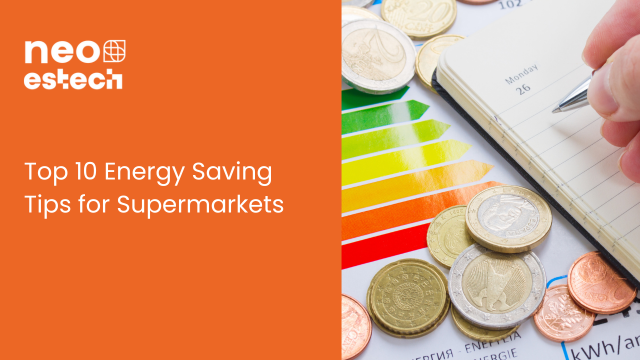Introduction:
The need for energy-saving practices has never been more evident than it is today. For supermarkets, where operating costs are high and profit margins are thin, adopting energy efficiency measures can result in substantial savings. Small changes in energy use can have a significant positive impact, reducing costs and contributing to sustainability. Here are the top 10 tips to help supermarkets optimize energy use.
1. Optimization of Refrigeration Systems
Refrigeration systems are the biggest energy consumers in supermarkets. To optimize your use:
- Implementation of Automation and Control: Implementation of Automation and Control: Installing automation systems that allow precise, real-time control of refrigeration units can significantly reduce energy consumption. Use systems that allow refrigeration capacity to be modulated according to demand, reducing energy consumption during periods of low demand.
- Equipment Commissioning: Perform proper commissioning of refrigeration equipment to ensure that all components are operating efficiently and in accordance with manufacturer specifications.
- Refrigerant Fluid: Make sure that the quality and quantity of the refrigerant fluid are adequate, avoiding under- or oversizing, which can lead to inefficiencies in the system.
- Attention to Sizing Ensure that refrigeration systems are correctly sized, avoiding both oversizing and undersizing, both leading to wasted energy.
- Preventative Maintenance Plan: Develop and follow a preventative maintenance plan to ensure that all components of refrigeration systems are operating optimally.
2. Improvement in the Efficiency of Air Conditioning Systems
Air conditioning is another major energy consumer. To increase efficiency:
- Programmable Thermostats Use programmable thermostats to automatically adjust the temperature during peak and off-peak times.
- Filter Maintenance: Clean or replace air filters regularly to ensure the system operates efficiently.
- Zoning: Implement a zoning system that allows temperature control in different areas of the supermarket, optimizing energy use as needed.
- Operating Hours Automation: Automate the operating hours of air conditioning systems to ensure they are only operating when necessary.
3. Efficient Use of Lighting
Lighting is responsible for a considerable part of energy consumption. Here are some possibilities for savings:
- Lighting Project Using LED: Develop an efficient lighting project using LED lamps, which consume up to 75% less energy and have a longer useful life.
- Using Natural Light: Make the most use of natural lighting, installing skylights or large windows to reduce the need for artificial lighting during the day, however, be careful with sunlight to avoid an increase in the thermal load of the air conditioning.
4. Implementation of Building Automation
Building automation can offer efficient control of energy use:
- Energy Management Systems: Install energy management systems that automatically monitor and control lighting, refrigeration and air conditioning.
- Real-Time Monitoring: Use real-time monitoring technology to identify consumption patterns and areas of waste, allowing for quick and efficient adjustments.
5. Preventative Maintenance
Regular equipment maintenance can prevent excessive energy consumption:
- Maintenance Plans Develop and follow a preventative maintenance plan for all major equipment, including refrigerators, air conditioners and lighting systems.
- Employee Training: Train staff to recognize signs of inefficiency and immediately report any problems, ensuring that equipment is kept in optimal working condition.
6. Taking Advantage of Monitoring Technologies
Using monitoring technologies can help to save energy significantly:
- Energy Sensors: Install energy sensors to monitor consumption in different areas and equipment, allowing detailed analysis and precise interventions.
- Data Analysis Software: Use specialized software to analyze energy consumption data, identifying trends and areas for improvement.
7. Efficient Management of Water Consumption
Although focusing on energy is crucial, efficiently managing water consumption can also contribute to energy savings:
- Installation of Low Flow Devices: Use low flow taps and toilets to reduce water consumption and, consequently, the energy used to heat water.
- Real-Time Water Consumption Monitoring: Implement real-time monitoring systems to quickly identify and correct leaks and waste.
- Water Reuse: Consider rainwater capture and reuse systems for activities that do not require drinking water.
8. Employee Engagement
Employees play a crucial role in saving energy:
- Awareness Campaigns: Carry out awareness campaigns about the importance of energy saving and recommended practices.
- Incentives: Offer incentives to teams or departments that achieve energy consumption reduction goals.
9. Participation in the Free Energy Market
Participating in the free energy market can provide significant savings:
- Contract Negotiation: Negotiate energy supply contracts directly with suppliers, obtaining more competitive rates and cost predictability.
- Viability Analysis: Evaluate the consumption profile and current conditions to determine the viability and potential benefits of migrating to the free energy market.
10. Investment in Renewable Energy Sources
Adopting renewable energy sources can significantly reduce long-term costs:
- Installation of Solar Panels: Consider installing solar panels to generate part of the energy consumed, taking advantage of tax incentives and financing programs.
- Contracting Distributed Generation from Other Renewable Sources: Explore distributed generation options from renewable sources, such as biogas and biomass, to diversify energy sources and increase energy resilience.
Conclusion:
Implementing these 10 tips can help supermarkets significantly reduce energy consumption, resulting in substantial savings and contributing to environmental sustainability. Small changes and strategic investments can have a big impact on energy efficiency, improving business competitiveness and profitability. By adopting these practices, supermarkets not only save money, but also strengthen their reputation with consumers and play an important role in preserving the environment.


